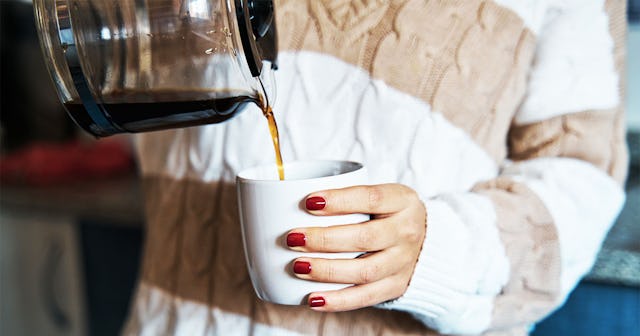Should You Have Coffee Before Or After Breakfast?

Every morning, my alarm goes off at 5:04 a.m. (Solo parent life—pre-dawn is often the only time I have to focus without distractions.) I snooze once or twice, roll out of my bed, and head instantly to my coffee maker. There, an oversize cup of coffee is already waiting for me.
A little cacao powder, a little milk, and I’m ready to start my morning.
That’s my routine. It’s deeply ingrained. It makes me happy, and my entire household knows that the day will be much smoother—for everyone—when I have a coffee in my hand less than two minutes after waking up.
Unfortunately, as it turns out, my daily routine might be doing more harm than good. Especially on those nights when my sleep was less than stellar.
Researchers at the University of Bath found that drinking coffee before breakfast, especially when you’ve had a bad night’s sleep, can have a negative impact on metabolic and blood sugar control.
The study, which was published in the British Journal of Nutrition, observed twenty-nine men and women over three nights. They found that drinking coffee after a poor night sleep “substantially increased participants’ blood glucose by about 50 %”. Which would be fine, except glucose spikes are a risk factor for both diabetes and heart disease.
My first thought: uh oh. My second thought: Let me take another sip of my pre-dawn, pre-breakfast coffee while I regroup and examine my life choices.
“Far-Reaching” Health Implications Of Coffee Before Breakfast
For coffee drinkers, the results of this study are probably counterintuitive. A bad night’s sleep is usually even more of a reason to reach for that strong coffee. Unfortunately, our blood sugar doesn’t agree.
Professor James Betts, Co-Director of the Centre for Nutrition, Exercise and Metabolism who oversaw the study noted that these findings could have “far-reaching health implications.”
That’s true on an individual level and on a global level. More than two billion cups of coffee are consumed every day. In the United States, more than half of all people above the age of 18 drink coffee daily.
Now What?
Those of us trying to balance our undying love of that first-thing-in-the-morning coffee with these new findings might be feeling a touch lost right now.
Fortunately, there are something things you can do to keep coffee in your life and limit your risk factors.
The most obvious solution, according to this study, is to eat breakfast about an hour before that first cup of coffee. If that feels like an impossible ask (as it does to me), then read on.
Lead researcher, Harry Smith from the Department for Health at Bath suggested eating “a breakfast that was lower in carbohydrate, especially sugar,” because “that would certainly reduce (or even remove) the blood glucose spike we see after eating.”
Many breakfast options are rich in carbohydrates (mostly sugar) but that doesn’t have to be the case.
It’s also important to point out that the glucose spikes were most prevalent in the participants after they’ve had a poor night’s sleep. That’s just another reason, of many, that getting a good night’s sleep is important to health.
If You Do Have A Bad Night’s Sleep And Want To Avoid Coffee
Let’s face it—it’s 2021. We’re living through an ongoing pandemic, through political, social, and economic uncertainty, through climate change. Disturbed sleep happens more often than most of us would like.
If we can’t (or shouldn’t) reach for that strong coffee, what can we do to combat a bad night’s sleep?
Water is (always) a good idea. After a bad night’s sleep hydration is particularly important. Also—sunlight. Rebecca Robbins, PhD, a sleep scientist at Brigham and Women’s Hospital and instructor of medicine at Harvard Medical School, recommends blue light exposure, which is found in natural sunlight.
A little exercise, a cat nap, and working to get back onto your regular sleep schedule are also ways to support yourself after a bad night’s sleep.
A Touch Of Good News
Aside from the impact of coffee on an empty stomach, researchers also made another discovery. They found that a single night of disrupted or poor sleep did not make a difference in a participant’s blood glucose response when compared to a regular night’s sleep.
While that may seem irrelevant, it’s actually good news. It means that one bad night’s sleep isn’t that big of deal—when it comes to metabolic effects, anyway.
It’s not exaggeration to say that my morning coffee is my favorite part of my morning. Which is why the findings from this study are especially disheartening. Not only because I’ve been in a coffee before my eyes are fully open routine for years, but because there’s almost no chance I can retrain myself to drink coffee later. Even if it means better health.
But with knowledge comes power. And even if I can’t alter my morning routine, then at the very least now I’m armed with the knowledge to best minimize my risk. It’s the best I can do. Ultimately, all any of us can do is our best.
This article was originally published on